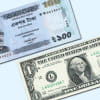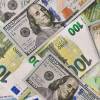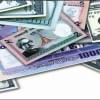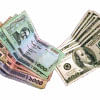Tk 111 a dollar for import remains only on paper

Earlier this month, the edible oil refiners' association wrote to the Bangladesh Trade and Tariff Commission seeking to increase prices of cooking oil.
The trade body's reasoning was that its members had been making payments for imports by purchasing each US dollar at rates between Tk 112 and Tk 124.
It said the price of edible oil had been fixed by factoring in the price of each dollar at Tk 111.
As they had been counting higher costs for a greenback, they sought to hike prices.
The request came three days after the sugar refiners' association said the increased cost of dollars had created numerous complexities in opening letters of credit (LCs) for import.
At present, its members have to pay for imports by purchasing each dollar at around Tk 120-123.
It is far higher than the uniform rate that bankers have been fixing for the past several months in an effort to curb volatility in the forex market.
Edible oil and sugar refiners are no exception. Elsewhere, it is the same ordeal.
Barring export-oriented factories, businesses that require imports are facing difficulties in opening LCs due to the banks' apparent unwillingness to facilitate imports given the continued dollar shortage in the forex market.
And even if someone is willing to pay higher rates for the greenback -- which has been becoming dearer for more than one and a half years -- there are no guarantees that they will get the required amount.
Neither is there a guarantee of equal treatment from bankers.
Bankers and officials of companies said large, influential clients had been getting preferential treatment in opening LCs and settling bills.
Officially, as per the Bangladesh Foreign Exchange Dealer's Association (BAFEDA) and Association of Bankers, Bangladesh (ABB), banks have to follow a uniform rate for buying and selling the greenback.
As such, they are supposed to sell a dollar at Tk 111 for imports.
In practice, things are different.
Importers are paying higher than the stipulated rate, albeit under different arrangements.
As Riad Mahmud, managing director of National Polymer Group, said: "At a rate of dollar of Tk 111 per dollar, we issued a cheque of Tk 11.10 crore against an LC of $1 million that we opened at a private bank to import raw materials. At the same time, we had to give another cheque of Tk 60 lakh to the bank."
"The bank quoted the price of a dollar at Tk 111. It then took Tk 60 lakh through another cheque. So, practically for us, the dollar price for the LC opening increases to Tk 117," he said.
"This has been happening for the past four-five months. If we do not accept their proposal, the bank does not process our LC. It is traceable by the central bank as there is a document," he said.
Mohammed Amirul Haque, managing director of Premier Cement, shared the same experience.
"We have seen a new system of corruption in the banking sector, particularly in the foreign exchange section," he said, citing bank officials' arguments that they have to collect dollars from the kerb market.
Irfan Uddin, general secretary of the Bangladesh Ceramic Manufacturers and Exporters Association (BCMEA), said export-oriented manufacturers do not face hassles in opening LCs and can then use their export earnings to import raw materials.
This leaves manufacturers who do not export facing problems.
Md Fazlul Hoque, managing director of Plummy Fashions Ltd, a leading knitwear exporter, said exporters had not been facing difficulties in opening LCs as payments for the imports are adjusted with export proceeds.
What do bankers say?
Bankers acknowledged the predicament brought on by the country's dwindling foreign exchange reserve as outflows outweigh inflows.
Bangladesh's foreign exchange reserve was $34 billion in gross terms a year ago. On November 15 this year, the total amount declined to $25 billion.
As per the Balance of Payment manual 6 of the International Monetary Fund, Bangladesh's forex reserve stood at $19.6 billion.
The taka lost roughly 30 percent in value over the past one and a half years.
"We have to buy the greenback from remitters and exporters at higher rates than the prescribed one. Is it possible for a bank to incur losses of Tk 10-12 per dollar?" questioned a chief of treasury of a private bank.
Bankers said only a handful of banks were buying and selling the greenback at uniform rates at the expense of business losses.
Others are offering higher rates so they can get the greenback, particularly from remitters, and serve their customers.
"Small clients and importers at the district level are facing a lot of problems in opening LCs. Banks are giving priority to large clients with whom they have other businesses," said a senior official of another private bank.
The official said a number of banks had been buying remittances at higher prices than the Tk 115-116 fixed by ABB-BAFEDA earlier this month.
Syed Mahbubur Rahman, managing director and CEO of Mutual Trust Bank Ltd, said none of the players in the market were playing fair.
"The market has gone out of control. It appears that the game has no rules, which are very important to ensure stability in the market" said Rahman, also a former chairman of ABB.
Bangladesh Bank Spokesperson Md Mezbaul Haque, also executive director of the central bank, declined to comment.
What is the way out?
Ahsan H Mansur, executive director of the Policy Research Institute of Bangladesh, said nobody was getting dollars at the officially determined rate.
"The greenback is available only if the buyer wants to pay more. This is the reality," he said.
Mansur, who has been advocating for a floating exchange rate, said: "It is better not to free the exchange rate at this moment, particularly ahead of the election. This should be done after the election along with significant monetary tightening."
"The interest rate has to rise and the government has to reduce its expenditure. No fresh money should be printed to finance public expenditure," he said.
Plummy Fashions MD Hoque was also not in favour of allowing market forces to determine the exchange rate.
"I am not an expert and it is true that, as an exporter, increased prices of dollars will benefit us. But it will not be right if the taka is allowed to float without plugging the loopholes for illegal money transfers abroad. In that case, the situation will become very dangerous."


 For all latest news, follow The Daily Star's Google News channel.
For all latest news, follow The Daily Star's Google News channel. 








Comments